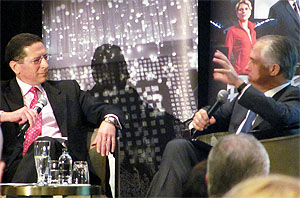Turnbull plans faster, scaled back NBN

A future coalition government would provide vouchers to rural and regional residents to subsidise the high costs of broadband, and renegotiate the Telstra and Optus deals, with the aim of using Telstra's copper for areas of fibre to the node, Shadow Communications Minister Malcolm Turnbull has today revealed.

Alex Malley, CEO of CPA Australia, with Malcolm Turnbull
(Credit: Josh Taylor/ZDNet Australia)
Speaking at a Committee for Economic Development of Australia (CEDA) lunch in Sydney today, Turnbull said that the next election would see the Coalition promise to deliver fast broadband to the public quicker than the 2020 completion date of the Labor Government's National Broadband Network (NBN) roll-out.
"We will be able to say to people, particularly in the outer suburbs of our big cities and indeed in regional Australia ... we will get you ... very fast broadband more quickly than the NBN will be delivered," he said.
To achieve this, the Coalition would first task the Productivity Commission to find the best way to deliver broadband in a cost-effective manner. Turnbull said that he expected this to take around six months and result in a policy of a mix of fibre, copper and other technologies.
"You would probably almost certainly continue with fibre to the home in greenfields sites because the incremental cost of running fibre into every premises versus copper is not ... as big as it is in brownfields," he said. "In terms of the bulk of the brownfields, existing built-up areas in the cities, there are some areas where you would run fibre right out to the home, or certainly very close to the home. And they might be areas where the copper network is very old or where it's very wet."
"There are some areas where there is just a lot of water on the ground and the maintenance is very high. You've just got to take a pragmatic approach."
In areas where the copper is still viable, Turnbull said fibre would be brought out "further into the field" so that the length of copper between the fibre and the premise was sufficiently short for the premise to get high speeds.
"And the speeds you're talking about there are ... very adequate, more than adequate in fact for domestic applications. And I'm talking 50Mbps to 60Mbps downloads, 5Mbps to 10Mbps uploads," Turnbull said. "You will struggle to notice any difference because there are not applications that require very, very high speeds over fibre to the home."
Turnbull would seek to renegotiate the $11 billion deal with Telstra to decommission its copper and hybrid fibre-coaxial (HFC) networks, as well as the $800 million deal with Optus for its HFC network.
"The decommissioning of the HFC networks, or disallowing them to be used, is completely nuts. That is economic vandalism. These are networks that have many years of life in them," he said.
Turnbull admitted that this would be costly, with each deal having some form of payout clause if a future government backs out, but he said it would be cheaper in the long run.
"There will be costs associated with a change of plan, but they will be tiny compared to the savings that will be achieved," he said.
Telstra's wholesale copper network would remain structurally separated, he said.
"That customer access network would become a regulated utility ... which would be able to charge prices by permission of the regulator that enables it to get a reasonable return on its capital. Insofar as it could not deliver the broadband services required on commercial terms because of distance or the lack of density of population, then there should be a transparent subsidy from the budget."
This subsidy would either be a capital subsidy to the telco for the additional costs of servicing regional Australia or would be given out as vouchers to rural households.
"I'm in favour of the bush being subsidised — it has to be — but it should not be at the expense of more expensive broadband in the cities," he said.
A report released earlier this week by former Liberal Minister Peter Reith into the 2010 election found that the lack of a detailed broadband plan cost the Liberal Party votes in Tasmania, but Turnbull would not be drawn on the topic of his predecessor Tony Smith.
"I don't want to express an opinion on that. I think the NBN was clearly a policy that worked for the government at the last election, [but] I think as people are beginning to see the enormous cost and the disproportionate cost relative to the benefit and they're starting to question it more and more," he said.
"I just want to stress that we are absolutely passionately committed to all Australians having access to very fast broadband at an affordable price. The point of difference between us and the Labor Party is how you go about it and we believe there is a faster and more cost-effective way of doing it and one which will actually result in cheaper broadband."